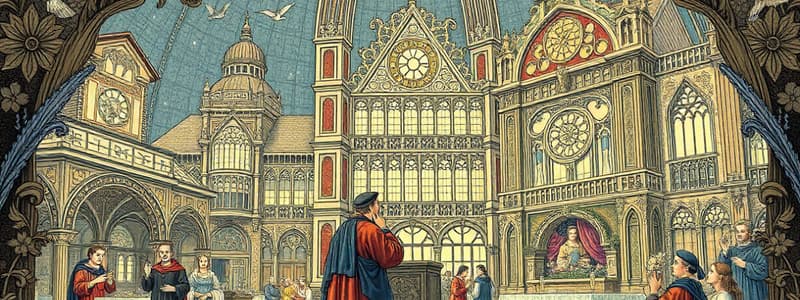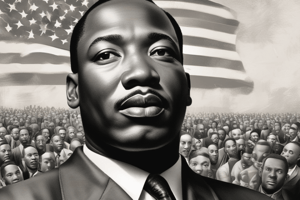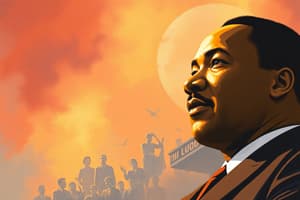Podcast
Questions and Answers
What is one of the key parts of Calvin's theology regarding mankind?
What is one of the key parts of Calvin's theology regarding mankind?
- Mankind is inherently good and virtuous.
- Mankind is unaffected by God's sovereignty.
- Mankind can achieve salvation through good works alone.
- Mankind is tainted by sin and depraved. (correct)
Which of the following best summarizes Calvin's view of God's nature?
Which of the following best summarizes Calvin's view of God's nature?
- God is equal to humanity in authority.
- God is benevolent and only judges based on actions.
- God is sovereign in all things. (correct)
- God is distant and uninvolved in human affairs.
Which branch of Protestantism is associated with John Calvin?
Which branch of Protestantism is associated with John Calvin?
- Anabaptist
- Lutheran
- Reformed (correct)
- Anglican
Which European country was influenced by Calvin's Protestant ideas during the 16th century?
Which European country was influenced by Calvin's Protestant ideas during the 16th century?
In what way did Calvin believe God interacts with humanity regarding salvation?
In what way did Calvin believe God interacts with humanity regarding salvation?
What prominent work is closely associated with John Calvin?
What prominent work is closely associated with John Calvin?
What term is associated with the Calvinist understanding of divine election?
What term is associated with the Calvinist understanding of divine election?
Which of these authors is known for promoting Reformed ideas alongside Calvin?
Which of these authors is known for promoting Reformed ideas alongside Calvin?
What was one of Martin Luther's criticisms of the book of James?
What was one of Martin Luther's criticisms of the book of James?
What was the primary reason Martin Luther turned against the peasant revolt?
What was the primary reason Martin Luther turned against the peasant revolt?
What role did Erasmus play in the translation of the New Testament?
What role did Erasmus play in the translation of the New Testament?
What notable action did Luther take after his initial support for the peasants?
What notable action did Luther take after his initial support for the peasants?
Why was Erasmus respected by both Reformers and Roman Catholics?
Why was Erasmus respected by both Reformers and Roman Catholics?
What was one of Martin Luther's concerns about the peasants' actions during the revolt?
What was one of Martin Luther's concerns about the peasants' actions during the revolt?
Who was Thomas Muntzer and what did he promote?
Who was Thomas Muntzer and what did he promote?
What did Luther do in 1525 related to his personal life?
What did Luther do in 1525 related to his personal life?
What is considered the final authority by Anabaptists?
What is considered the final authority by Anabaptists?
What type of baptism did Anabaptists practice?
What type of baptism did Anabaptists practice?
Which of the following beliefs do Anabaptists reject?
Which of the following beliefs do Anabaptists reject?
Who is regarded as the founder of the Anabaptist movement in Switzerland?
Who is regarded as the founder of the Anabaptist movement in Switzerland?
What was one of the primary reasons Anabaptism appealed to certain groups?
What was one of the primary reasons Anabaptism appealed to certain groups?
In what year did Felix Manz become the first martyr of the Anabaptist movement?
In what year did Felix Manz become the first martyr of the Anabaptist movement?
Anabaptists believed in complete separation of which two entities?
Anabaptists believed in complete separation of which two entities?
What was the nature of oaths according to Anabaptist beliefs?
What was the nature of oaths according to Anabaptist beliefs?
Who directed the Scottish Parliament in 1560 to begin religious reform?
Who directed the Scottish Parliament in 1560 to begin religious reform?
What significant action did Louis XIV take in 1685 regarding the Edict of Nantes?
What significant action did Louis XIV take in 1685 regarding the Edict of Nantes?
What key development occurred in the Church of Scotland in 1567?
What key development occurred in the Church of Scotland in 1567?
What was one of the reasons Scotland allied with France from the 14th century?
What was one of the reasons Scotland allied with France from the 14th century?
Which of the following actions did the Scottish Parliament take regarding the Pope in the late 1500s?
Which of the following actions did the Scottish Parliament take regarding the Pope in the late 1500s?
Who introduced Lutheran ideas to Scotland, leading to significant religious changes?
Who introduced Lutheran ideas to Scotland, leading to significant religious changes?
Which monarch was NOT a key player in the English Reformation?
Which monarch was NOT a key player in the English Reformation?
Which influential figure was burned in 1546 for his religious beliefs in Scotland?
Which influential figure was burned in 1546 for his religious beliefs in Scotland?
What role did the Lollards play in the English Reformation?
What role did the Lollards play in the English Reformation?
What influence did John Calvin have on John Knox during Knox's time in Geneva?
What influence did John Calvin have on John Knox during Knox's time in Geneva?
What marked the end of French control over Scotland?
What marked the end of French control over Scotland?
Which of these figures was known as 'Bloody Mary' during the English Reformation?
Which of these figures was known as 'Bloody Mary' during the English Reformation?
What was one of the primary criticisms of the Roman Catholic Church in Scotland during this period?
What was one of the primary criticisms of the Roman Catholic Church in Scotland during this period?
In what year was the Church of Scotland formally established?
In what year was the Church of Scotland formally established?
In what year did John Knox return to Scotland to advocate for reform?
In what year did John Knox return to Scotland to advocate for reform?
Which legislative body played a crucial role during the English Reformation?
Which legislative body played a crucial role during the English Reformation?
Flashcards are hidden until you start studying
Study Notes
Martin Luther
- Assisted William Tyndale by giving him the 1522 edition of the Greek New Testament, which Tyndale used for his English translation in 1525-1526.
- Was outspoken and controversial, calling the book of James "an Epistle of Straw" because of its emphasis on works.
- Initially reached out to the Jews but turned against them later when they did not respond.
- Was initially sympathetic to the demands of the Peasants' Revolt in 1524, but later turned against them and wrote Against the Robbing and Murdering Hordes of Peasants.
- Justified his stance against the peasants by arguing that:
- They broke their oath to serve their rulers.
- They robbed, murdered, and plundered.
- They committed their crimes in God's name.
- Married Katherine von Bora, a former nun, in 1525.
Erasmus
- Leading humanist scholar and leader of the Renaissance in Europe.
- Respected by both Reformers and Roman Catholics.
- Published the Greek New Testament in 1516, which became the basis for several translations including Luther's German and Tyndale's English.
- Also influenced the King James Bible of 1611.
- Taught at Cambridge University.
- More of a social reformer than a theological or ecclesiastical one.
- Criticized the excesses, ignorance, and lifestyle of the clergy.
John Calvin
- Used his critical abilities as a humanist scholar and lawyer in theology.
- Believed God's sovereignty dictates all things.
- Described mankind as tainted by sin and depraved.
- Argued that God elected his own people before the creation of the world.
- Believed God calls people to salvation in time, enabling them to transform the world and establish God's Kingdom.
The Four Main Branches of Protestantism
- Lutheran (Germany, Scandinavia)
- Reformed (Switzerland, Holland, Scotland, France)
- Anabaptist (Switzerland, Germany, Holland)
- Anglican (England)
France and the Protestant Reformation
- Lutheran ideas reached France in the early 16th century.
- John Calvin and others promoted Protestant ideas in France.
- The Edict of Nantes, which granted religious freedom to Protestants, was revoked in 1685 by Louis XIV – leading many Huguenots (French Protestants) to flee to other countries.
Scotland and the Protestant Reformation
- From the 14th century, Scotland allied with France against England, resisting English interference.
- The Roman Catholic Church was perceived as immoral and corrupt in Scotland.
- Patrick Hamilton introduced Lutheran ideas and was burned in 1528; George Wishart followed suit in 1546.
- Wishart influenced John Knox, who became a priest in 1530.
- Knox traveled to Geneva and was influenced by John Calvin.
- Knox returned to Scotland in 1559, coinciding with the Scottish nobility's covenant to bring about religious reform. French control over Scotland ended in 1560.
- The Scottish Parliament, under the direction of John Knox, began religious reform in 1560.
- The Church of Scotland was formally established in 1567, with presbyteries, synods, and a national assembly.
- The Pope lost control, the mass was declared illegal, and laws against heretics were repealed.
England and the Protestant Reformation
- Key players in the English Reformation:
- Monarchs: Henry VIII, Edward VI, Mary Tudor (Bloody Mary), Elizabeth I.
- Parliament.
- The Lollards (Wycliff's followers), who spread their teachings secretly.
Anabaptists
- Shared key beliefs:
- The Bible is the final authority.
- The pure church is an association of the regenerated.
- Adult baptism (initially by pouring water, later requiring immersion).
- Objected to infant baptism as unscriptural.
- Complete separation of church and state.
- Pacifism.
- Refused to take oaths in courts.
- Simple speech ("yes" and "no").
- Appealed to peasants and simple folk ignored by other Reformers.
Conrad Grebel
- Regarded as the founder of the Anabaptist movement in Switzerland.
- Closely associated with Zwingli, but separated from him in 1525.
Felix Manz
- First Anabaptist martyr, executed in Zurich in 1527.
Studying That Suits You
Use AI to generate personalized quizzes and flashcards to suit your learning preferences.





